Cremation, Caste, and Cosmogony in Karmic Traditions.
Cremation, Caste, and Cosmogony in Karmic Traditions.
Cremation, Caste, and Cosmogony in Karmic Traditions.
Create successful ePaper yourself
Turn your PDF publications into a flip-book with our unique Google optimized e-Paper software.
follows her husb<strong>and</strong> purifies the three families on her<br />
mother’s side, the three families on her father’s side <strong>and</strong><br />
the three families on her husb<strong>and</strong>’s side” (Garunda<br />
Purana II, 4.95-97), or the slightly less prosperous fate;<br />
“A wife who dies <strong>in</strong> the company of her husb<strong>and</strong> shall<br />
rema<strong>in</strong> <strong>in</strong> heaven as many years as there are hairs on his<br />
person” (Garunda Purana I, 107.29). As seen with the<br />
murder of Roof Kanvar, this sati was <strong>in</strong>terpreted <strong>in</strong>to the<br />
hydrological circle to justify her death. And allegedly,<br />
the good ra<strong>in</strong>s had never been better, <strong>and</strong> it ended the<br />
three-year, deadly drought.<br />
Regard<strong>in</strong>g the elements of sacrifice, accord<strong>in</strong>g to Rig-<br />
Veda; “The same water travels up <strong>and</strong> down day after<br />
day. While the ra<strong>in</strong>-clouds enliven the earth, the flames<br />
enliven the sky” (Rig-Veda 1.164.51). In the Bhagavad-<br />
Gita it is stated, “all liv<strong>in</strong>g bodies subsist on food gra<strong>in</strong>s,<br />
which are produced from ra<strong>in</strong>s. Ra<strong>in</strong>s are produced by<br />
performance of yajna (sacrifice), <strong>and</strong> yajna is born of<br />
prescribed duties” (Bg 3.14). In other words, ra<strong>in</strong> falls<br />
from the sun <strong>in</strong> the sky <strong>in</strong> return for fire <strong>and</strong> flames from<br />
sacrifices performed on earth (O’Flaherty 1994:83). In<br />
some texts the deceased is referred to as a person who<br />
enters the smoke of the cremation pyre, becomes clouds<br />
<strong>and</strong> ra<strong>in</strong>, then vegetables, <strong>and</strong> if eaten, sperm<br />
(O’Flaherty 1981a:42). Morally, I am strongly aga<strong>in</strong>st<br />
widow burn<strong>in</strong>g <strong>and</strong> I believe that this practice cannot be<br />
defended, <strong>and</strong> therefore, the follow<strong>in</strong>g discussion is<br />
purely theoretical <strong>and</strong> cosmological, <strong>and</strong> the aim is to<br />
grasp the soteriological reason<strong>in</strong>g beh<strong>in</strong>d this practice <strong>in</strong><br />
a cosmogonic perspective. Strictly speak<strong>in</strong>g, follow<strong>in</strong>g<br />
the priests who argue that it was necessary for Roop<br />
Kunvar to sacrifice herself, her death represented the<br />
uttermost act of devotionalism, which created a common<br />
good for society: ra<strong>in</strong>. S<strong>in</strong>ce she allegedly atta<strong>in</strong>ed<br />
heaven, her m<strong>in</strong>d must have become div<strong>in</strong>e, <strong>and</strong><br />
consequently the quality of the flesh would have been<br />
equally pure. Logically, s<strong>in</strong>ce her soul rema<strong>in</strong>ed <strong>in</strong><br />
heaven, the only th<strong>in</strong>g left to redistribute back to society<br />
as ra<strong>in</strong>, was her body. This fits very well with the above<br />
quoted passages from the sacred scriptures: the sacrifice<br />
of humans is transferred back to society as ra<strong>in</strong>. The<br />
hydrological cycle is completed.<br />
Death is ethicised through the life-giv<strong>in</strong>g waters. On the<br />
one h<strong>and</strong>, karma is noth<strong>in</strong>g but a pr<strong>in</strong>ciple govern<strong>in</strong>g<br />
death <strong>and</strong> the different entrances <strong>and</strong> exits. On the other<br />
h<strong>and</strong>, water is the good gift from the gods <strong>and</strong> it is<br />
actively <strong>in</strong>corporated <strong>in</strong>to all spheres of human<br />
<strong>in</strong>teraction. Water is therefore the ultimate means by<br />
which the gods transfer prosperity back to humans on a<br />
collective level. As argued earlier, the soul atta<strong>in</strong>s an<br />
<strong>in</strong>carnation <strong>in</strong> accordance with his or her karma<br />
(<strong>in</strong>clud<strong>in</strong>g the other variables mentioned), but as I also<br />
have emphasised, the mourn<strong>in</strong>g period is <strong>in</strong> accordance<br />
with the purity/impurity of the flesh. If death is a<br />
purify<strong>in</strong>g process rather than a pollut<strong>in</strong>g process, as<br />
argued <strong>in</strong> chapter 13, then the sons mourn <strong>and</strong> cleanse<br />
the body of the pollution <strong>in</strong> accordance with their varna<br />
belong<strong>in</strong>g. The descendants prepare the flesh <strong>and</strong> present<br />
286<br />
it to the gods through the funeral pyre. Consequently, the<br />
Aghoris do not make any dist<strong>in</strong>ctions between a funeral<br />
pyre <strong>and</strong> a sacrificial fire (Svoboda 1993b:45). <strong>Caste</strong><br />
differences are abolished after death <strong>and</strong> therefore it is<br />
irrelevant whether the deceased was a Sudra or Brahman<br />
when alive. The descendants prepare the flesh of the<br />
dead <strong>in</strong> accordance with the impurity, but when the<br />
funeral is completed then all flesh carried to the gods<br />
through Agni’s fires are equally pure. The pure flesh<br />
offered to the gods is not a part of the deceased’s<br />
<strong>in</strong>carnation <strong>in</strong> itself, but a premise for it to take place,<br />
<strong>and</strong> hence there is a karmic component <strong>in</strong>terwoven <strong>in</strong> the<br />
soteriology of society. In other words, the gods only<br />
allow an <strong>in</strong>dividual soul to become <strong>in</strong>carnated <strong>in</strong><br />
accordance with his or her own karmic deeds if the<br />
descendant fulfils his dharma, which is to observe the<br />
death rituals <strong>in</strong> the prescribed manner <strong>and</strong> prepare the<br />
flesh of the corpse for the gods. If the relatives fail <strong>in</strong><br />
this mission, then immediately the deceased will suffer<br />
<strong>and</strong> later the descendants. This seems logical, plausible,<br />
<strong>and</strong> <strong>in</strong> accordance with the <strong>in</strong>formants’ underst<strong>and</strong><strong>in</strong>g of<br />
the necessity of hav<strong>in</strong>g a son to conduct the funeral.<br />
Thus, the body – or the water <strong>in</strong> cosmological terms – is<br />
the ultimate means by which micro- <strong>and</strong> macro-cosmos<br />
are comb<strong>in</strong>ed through sacrifice <strong>and</strong> cosmogony.<br />
Return<strong>in</strong>g to Obeyesekere’s dist<strong>in</strong>ction between<br />
ethicisation step 1 <strong>and</strong> step 2, one may ga<strong>in</strong> greater<br />
<strong>in</strong>sight <strong>in</strong>to this process through the way the life-giv<strong>in</strong>g<br />
waters are procured <strong>and</strong> distributed by the gods.<br />
Ethicisation step 1 was the process whereby one is<br />
judged <strong>and</strong> rewarded <strong>in</strong> heaven or punished <strong>in</strong> hell <strong>in</strong><br />
accordance with the deeds performed on earth.<br />
Ethicisation step 2 was the process whereby one<br />
becomes <strong>in</strong>carnated back onto this earth <strong>in</strong> either good<br />
or bad re<strong>in</strong>carnations. As Obeyesekere po<strong>in</strong>ted out<br />
regard<strong>in</strong>g Buddhism, there is an <strong>in</strong>herent contradiction <strong>in</strong><br />
this moral-philosophical system, which cannot account<br />
for how <strong>and</strong> why a person should be <strong>in</strong>carnated on earth<br />
<strong>in</strong> accordance with good or bad deeds if he or she<br />
already has been rewarded or punished <strong>in</strong> heaven <strong>and</strong><br />
hell (Obeyesekere 2002:236). The flesh as life-giv<strong>in</strong>g<br />
waters might be the key to this problem <strong>and</strong> why the<br />
transformation between ethicisation step 1 <strong>and</strong> step 2<br />
takes place. The soteriology of society is a matter of the<br />
good waters – or the vital energy <strong>in</strong> more general terms.<br />
In karmic traditions the <strong>in</strong>dividual death is not solely a<br />
matter for the deceased himself or the l<strong>in</strong>eage, but it<br />
<strong>in</strong>cludes society as well. Thus, when the dead becomes<br />
both a means for the welfare of society <strong>and</strong> an <strong>in</strong>dividual<br />
who must take care of his own salvation, then it seems<br />
that the karmic ideology is developed. In societies with<br />
re<strong>in</strong>carnation, ethicisation step 2 takes places when it is<br />
not only the deceased’s future but also the welfare of<br />
society <strong>and</strong> cosmos which are at stake when a member<br />
of society dies. This is the consequence of the unity of<br />
micro- <strong>and</strong> macro-cosmos.<br />
What happens <strong>in</strong> a funeral? Imag<strong>in</strong>e a scenario. The<br />
dead is cremated <strong>and</strong> the fire carries both the soul <strong>and</strong>


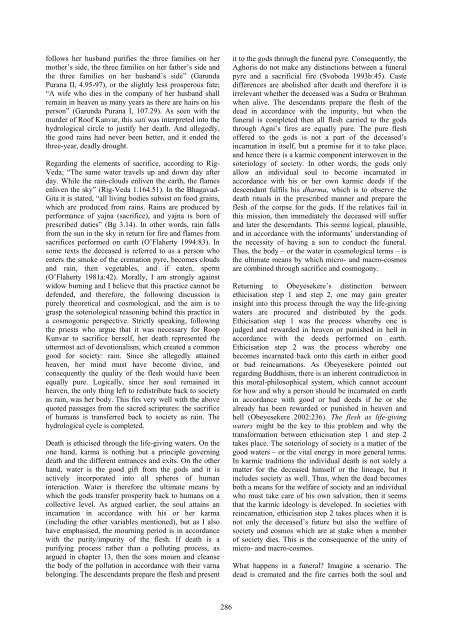
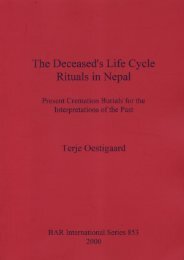


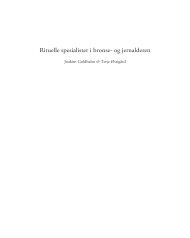
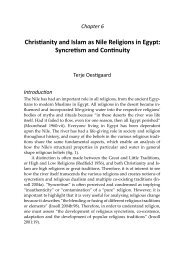
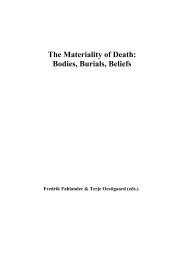


![Fullmono-AK [P2118].indd - oestigaard](https://img.yumpu.com/18994998/1/177x260/fullmono-ak-p2118indd-oestigaard.jpg?quality=85)